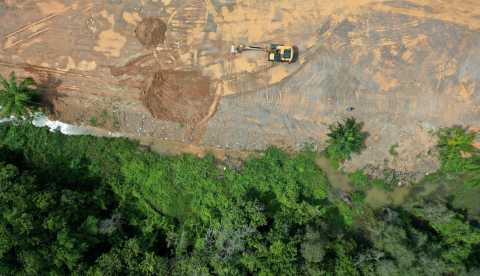Overview of the extractive industries
3.1 Exploration data
Requirement:
Fully met
90
The Secretariat assessment is that Guyana has fully met Requirement 3.1. The 2018 EITI Report provides a comprehensive overview of significant exploration activities. For the mining sector, the report describes the geological distribution in the country, subdivisions, characteristics of mining districts, and their location. This information is systematically disclosed through the GGMC website. In the case of gold, bauxite and diamonds, information about the history, active mines and projects is also included. Information about additional minerals and gems such as copper, iron, quartz or jasper is briefly described and disclosed through the GGMC website. The 2018 EITI Report provides information about the main exploration projects in mining, as well as data about gold and bauxite reserves. This information is systematically disclosed on company websites. Information regarding history, exploitation mechanisms, and international conventions applicable to ASM is included. However, government action plans in this sector are briefly described and the EITI Report does not provide information about future developments or the potential of small-scale mining in the country. When compared to the mining sector, information about the oil and gas exploration activities in the Guyana’s 2018 EITI Report is less detailed. However, the document provides sufficient information about the main exploration activities in the country by describing the geological characteristics in the country, the previous and current oil exploration projects, the main companies in the sector, as well as their assigned exploration blocks. This information can be accessed through the GGMC and local news website.
6.3 Contribution of the extractive sector to the economy
Requirement:
Fully met
90
The Secretariat assessment is that Guyana has fully met Requirement 6.3. The 2018 Guyana EITI Report discloses relevant information about the contribution of the extractive industries to the economy for the 2018 year. The EITI Report includes information about the Gross Value Added of the mining sector, government revenues, exports, and employment. This information is systematically disclosed through the Bank of Guyana Annual Reports. However, employment data is not disaggregated and there is no evidence of attempts made by the MSG to provide this information. Guyana’s report provides information about key regions where production is concentrated. For the oil and gas sector, a map referring to licenses is included in Annex 2 of the EITI Report. For the mining sector, information about current and prospective licenses is systematically disclosed in the GGMC website. Overall, Guyana has made progress in the objective of Requirement 6.3 by expanding the scope of the report to the oil and gas, forestry and fisheries sectors when compared to the 2017 EITI Report. This information provides a better understanding about the level of natural resource dependency in the economy.
Legal and fiscal framework
2.1 Legal framework
Requirement:
Fully met
90
EITI reporting provides an overview and summary description of the laws and regulations governing the extractive industries in Guyana. While EITI reporting provides some contextual analysis of the legal framework, relevant laws and regulations appear to be systematically disclosed, although information on the enforcement of laws does not yet seem systematically disclosed. The disclosures included in GY-EITI Reports include reference to ongoing and planned legal reforms. Stakeholder consultations however indicated that additional reforms of the 1989 Guyana Mining Act have been planned and a bill drafted, although this was not covered in EITI Reporting. In its comments on the draft assessment, the MSG noted the availability of amendments to mining regulations on the websites of GGMC and the Parliament. However, stakeholders consulted confirmed that a draft of the Mining Bill had not yet been made publicly accessible, but that future EITI reporting would cover such reforms. Stakeholders indicated that work on implementing reforms to the mining sector legal and regulatory framework has slowed. Some stakeholders considered the Petroleum (Exploration and Production) Act 1986 outdated and inadequate in regulating a sector which had grown both more complex and economically important in Guyana since the Act was originally passed. Even so, the extractives legal framework in force was systematically disclosed in the period under review. Stakeholder consultations indicated ongoing reforms within the Ministry of Natural Resources regarding monitoring of the environmental impact of oil and gas production, including levying larger fines on operators for gas flaring, although this was not covered in EITI Reports to date. EITI Reporting highlighted reforms relating to the NRF, which at the time of reporting were ongoing reforms. There is no evidence that legal reforms in the extractive industries are systematically disclosed on government websites. In its comments on the draft assessment, the MSG noted that some information on reforms was published on the Ministry of Natural Resources, GGMC and GGB websites, albeit without providing specific links to this information.
2.4 Contracts
Requirement:
Partly met
30
The Secretariat's assessment is that Guyana has partly met Requirement 2.4. The government’s policy on public disclosure of licenses and contracts in the mining and petroleum sectors remains unclear from public documents, beyond the 2018 EITI Report’s reference to a lack of legal barriers to the disclosure of such documents. The report explains that only some of the petroleum contracts have been disclosed and that none of the licenses nor mining contracts have been publicly disclosed to date, but without any explanation of the potential deviation from government policy. It remains unclear from public sources whether any mining or petroleum contracts and licenses were granted, entered into or amended since 1 January 2021, but no such license or contract appears to be publicly available, if applicable. There is no discussion in GY-EITI documents about potential legal or practical barriers to the full disclosure of all licenses and contracts awarded or amended from January 2021 onwards. In its comments on the draft assessment, the MSG clarified that it had requested a full list of all mining contracts from the Ministry of Natural Resources, but that it had not received the list to date. The MSG has only documented the disclosure of some petroleum contracts pre-dating January 2021 in general terms but has not published a comprehensive list of all active mining and petroleum licenses and contracts, clearly indicating which have been published and which have not (with specific links where applicable). While three oil and gas contracts (pre-dating 2021) have been published on the Department for Public Information and GY-EITI websites, this includes only the main body of the contract but none of the annexes, nor amendments or riders if applicable.
6.4 Environmental impact
Not assessed
Codes of Practice are systematically disclosed and set out the legal mandate for enforcement, authority delegated by statute and monitoring systems for environmental legal compliance and enforcement. The Environmental Protection Act (No. 11 of 1996) Art. 36, requires the establishment and maintenance of a public register of information relating to environmental assessments and approvals and requires information to be accessible to the public 60 days from the granting of an environmental permit. This register has not been fully digitised and only a small section of the EIAs submitted and environmental permits granted by the EPA can be accessed on the EPA website.
The EPA’s website discloses a partial database of environmental impact assessments (EIAs), environmental and social impact assessments (ESIAs) environmental baseline studies and environmental permits. These assessments are uploaded as both drafts, revised and final versions. The database includes a function to disclose document controls and update when users download environmental information, however this content is mostly incomplete, with data indicating date of application, upload, administration and edit missing. No environmental management plans are disclosed on the EPA website. This significant gap in disclosures undermines monitoring of the specific actions required of extractive industry operators to mitigate the environmental and social risks and impacts analysed in project-level EIAs and other legally required environmental reporting, as the regulator’s requirements for environmental management of a project are usually set out in the EMP. EITI Reporting lists the laws relevant to environmental management of the extractive industries in Guyana but provides no further information on the environmental monitoring procedures and administrative practices undertaken in the reporting period. Documentation submitted by the MSG for this Validation highlighted significant gaps in the administrative practice of the EPA and its environmental approvals board.
Licenses
2.2 Contract and license allocations
Requirement:
Partly met
30
The Secretariat's assessment is that Guyana has partly met Requirement 2.2. In mining, the 2018 EITI Report confirms the number of licenses awarded and transferred in 2018, although there is only publicly accessible information on the list of licenses awarded in this period, not on the licenses transferred. While the report provides a description of the statutory license award and transfer procedures, albeit with little detail on the transfer procedure, it refers to, but does not describe, the specific technical and financial criteria assessed in either license awards or transfers. Stakeholder consultations confirmed that there were clear technical and financial criteria set for mining license awards and transfers, but that there were no weightings applied to each, even if the list of criteria assessed was not yet publicly accessible. While the Validation template states that there were no non-trivial deviations in either license awards or transfers in 2018, there is no reference to this in the 2018 EITI Report and the methodology for the MSG’s assessment of non-trivial deviations remains unclear based on publicly accessible documents.
In oil and gas, the 2018 EITI Report confirms the lack of new license awards in 2018 but does not clarify whether any transfers of oil and gas licenses, or participating interests in blocks, took place in this period. While the MSG’s submission for Validation stated that there had been no transfers of participating interests in oil and gas blocks in 2018, public sources indicate that there was at least one transfer of participating interests in the Orinduik block in October 2018. While the report provides a description of the statutory license award and transfer procedures, albeit with little detail on the transfer procedure, it remains unclear from publicly accessible documents whether any technical and financial criteria are assessed in either oil and gas license awards or transfers. Government officials explained that rigorous checks of license applicants were performed (even if the criteria against which these checks were performed were not made public) but that these could be waived in the instance of well-known international oil companies (IOCs), as are the majority of the oil companies currently operating in Guyana. As for mining, the Validation template provides the MSG’s assessment that there were no non-trivial deviations in either awards or transfers (despite the absence of awards in 2018), although the lack of reference to the MSG’s methodology in assessing such deviations in either the 2018 EITI Report or other public documents is a concern.
2.3 Register of licenses
Requirement:
Mostly met
60
The Secretariat's assessment is that Guyana has mostly met Requirement 2.3. There is no publicly available register or cadastre system in either mining or oil and gas in Guyana, as existing license registers appear to be maintained only for internal ministry purposes at present. All disclosures on license information are through the EITI Report, which appear to cover all active licenses irrespective of the materiality of payments to government related to each license. In mining, while the annexes to the 2018 EITI Report provide information on license numbers, license-holding company names, dates of award and expiry for most of the licenses as well as commodity(ies) covered, it does not provide dates of application or coordinates for any of the licenses, nor dates of expiry for some licenses. In addition, survey licenses do not appear to be covered by the annexes.
In oil and gas, the 2018 EITI Report provides a list of 10 petroleum licenses, including license numbers, license-holding company names, dates of award, of expiry but not of application. However, while a map of oil and gas blocks is provided in Annex 2 it is of too low definition to estimate the coordinates of each license and it remains unclear whether petroleum licenses cover both crude oil and natural gas.
Ownership
2.5 Beneficial ownership
Requirement:
Partly met
30
The Secretariat's assessment is that Phase 1 in the Validation of Requirement 2.5 is only partly met in Guyana. The government’s policy on the public disclosure of beneficial ownership of extractive companies is unclear from publicly available sources, even if the 2018 EITI Report provides a cursory overview of relevant laws and regulations, including the definition of beneficial ownership and politically exposed persons. Guyana appears to only have undertaken beneficial ownership data collection through EITI reporting to date, targeting only material companies included in the scope of reconciliation rather than all companies holding or applying for extractive licenses. The beneficial ownership of only seven of the 59 material companies covered by the 2018 EITI Report has been published to date. While the information requested and disclosed related to such companies includes the minimum data points listed under Requirement 2.5.d and the 2018 EITI Report provides a cursory description of quality assurances requested from reporting companies, there is only a public brief assessment by the MSG of the comprehensiveness of beneficial ownership disclosures by material companies in the 2018 EITI Report, not of the comprehensiveness and reliability of beneficial ownership disclosures from all extractive companies. The 2018 EITI Report provides a list of publicly listed companies within the scope of reconciliation, including the names of stock exchanges where they are listed and links to their stock exchange filings, but it is unclear whether the MSG has confirmed whether each of these companies is a wholly owned subsidiary of the publicly listed entity. While the 2018 EITI Report provides the legal ownership of a minority of material companies included in the scope of reporting, legal ownership information of all extractive companies does not yet appear to be publicly available, and the Deeds and Commercial Registry Authority (DCRA) does not appear to operate a publicly accessible online company register from which legal ownership information is available.
State participation
2.6 State participation
Requirement:
Partly met
30
The Secretariat's assessment is that Guyana has partly met Requirement 2.6. The 2018 EITI Report and the Validation template on Transparency categorise NICIL and GGB as material SOEs for EITI reporting purposes, although the basis for this assessment remains unclear based on Guyana EITI Reports and MSG meeting minutes. Several stakeholders consulted confirmed that the two entities had been included as material SOEs given that they were incorporated as companies and were considered to collect material revenues. In its comments on the draft assessment, the MSG called for greater attention on whether GGB should be considered a SOE for EITI reporting purposes in future. The report provides a cursory description of NICIL and GGB's statutory requirements to transfer a share of revenues to government, but do not clarify the statutory rules related to the transfer of funds from the state to the SOEs, the SOEs' ability to retain earnings, reinvest in their operations or raise third-party (debt or equity) financing. The report provides a list of state participations in the mining sector, although the comprehensiveness of this list remains unclear given that the government failed to report any state participations, which were only reported by material companies included in the scope of reporting. One stakeholder consulted considered that it was likely that this list of state participations was not comprehensive given the lack of government reporting of these participations. The terms attached to these state participations in mining companies remain unclear from public documents, although one stakeholder consulted considered that the equity interests in mining companies was held on a full-paid equity basis. The report does not refer to the MSG's assessment of any loans or loan guarantees provided either by the state, or the two material SOEs, to any extractive companies operating in Guyana. None of the encouraged aspects of Requirement 2.6, such as the rules and practices related to SOEs' corporate governance, are described either in the 2018 EITI Report or other public sources referenced by the MSG for this Validation.
4.2 In-kind revenues
Not applicable
The Secretariat's assessment is that Requirement 4.2 was not applicable in Guyana in 2018. There is no evidence of in-kind revenues in the mining sector, while oil production in Guyana only commenced in December 2019, after the period under review. However, the state is entitled to in-kind revenues under the production-sharing contract framework in the oil and gas sector, which means that Requirement 4.2 will be applicable in Guyana for EITI Reports covering 2020 onwards. The Department of Energy has started disclosing the volumes and values of each of the seven oil cargos exported between 2020 and July 2021 on its website, albeit without information required by Requirement 4.2 such as the identity of the buyer.
4.5 SOE transactions
Requirement:
Partly met
30
The Secretariat's assessment is that Guyana has partly met Requirement 4.5. Extractive company payments to GGB have been reconciled, although around 15% of revenues collected by GGB do not appear to have been reconciled, which raises concerns over the comprehensiveness of these disclosures. While GGB's transfers of two revenue streams (royalties and withholding tax) to GGMC were included in the scope of reconciliation, there is only evidence of the reconciliation of royalty transfers in the report. There is no information in the report on the value of transactions involving NICIL given the SOE's lack of participation in EITI reporting for 2018. Stakeholders consulted explained that NICIL had refused to participate in the 2018 EITI Report as they had requested an official letter from the Ministry of Finance directing them to do so, which had not been provided. It is unclear from the EITI Report or other public sources referenced by the MSG on whether the state made any transfers to either GGB or NICIL in 2018 and the value of such transfers, if applicable, is not disclosed.
6.2 SOE quasi-fiscal expenditures
Requirement:
Partly met
30
The Secretariat's assessment is that Requirement 6.2 is partly met in the period under review. While the 2018 EITI Report states that the MSG included disclosures of quasi-fiscal expenditures in the scope of reporting for NICIL, but not for GGB, the other entity it categorises as a SOE for EITI reporting purposes, there is no evidence of any further work by the MSG related to transparency in quasi-fiscal expenditures and there have been no disclosures of such expenditures, if they exist. The Secretariat welcomes the inclusion of both GGB and NICIL in EITI reporting. However, it remains unclear based on publicly accessible information whether these SOEs engage in quasi-fiscal expenditures. In its comments on the draft assessment, the MSG did not provide additional clarifications of its methodology for assessing the existence of quasi-fiscal expenditures. However, civil society MSG members provided comments on the draft assessment that indicated that the constituency did not consider the objective of Requirement 6.2 to be in the process of being fulfilled.
Production and exports
3.2 Production data
Requirement:
Fully met
90
The Secretariat's assessment is that Requirement 3.2 is fully met, but not yet exceeded. Total production volumes and values of mineral commodities are disclosed in the 2018 EITI Report, disaggregated by commodity, by region and by company. While aggregate production volumes for extractive commodities are systematically disclosed through the Bank of Guyana website, production values are not. Production values provided in the 2018 EITI Report do not include information about artisanal mining production, although these were not considered to give rise to material revenues to government
3.3 Export data
Requirement:
Fully met
90
The Secretariat's assessment is that Requirement 3.3 is fully met. For the mining sector, total export volumes and values are disclosed in the 2018 EITI Report disaggregated by commodity, but not by state, region of origin, company or project. Extractive commodity export volumes and values are systematically disclosed by GGMC and the Bank of Guyana. The methods and sources for calculating export information are not described in the 2018 EITI Report. The report does not include information about artisanal mining exports.
Revenue collection
4.1 Comprehensiveness
Requirement:
Partly met
30
The Secretariat's assessment is that Requirement 4.1 is partly met. While the 2018 EITI Report provides an explanation for the scope of the reconciliation, including the materiality of revenue streams and companies, there are significant concerns over the comprehensiveness of the agreed scope in light of the lack of full government disclosure of total revenues from the extractive industries, concerns over weaknesses in government record-keeping and the exclusion of signature bonuses from the scope of reconciliation without explanation.
The 2018 EITI Report is transparent about concerns that material payments to government from extractive companies may have been excluded from the scope of reconciliation. Nonetheless, material revenue streams and companies are listed and described in the report. Two thirds of material companies and a third of material government entities did not participate in EITI reporting. However, while the report contains the IA’s assessment that the reconciliation was not comprehensive, it does not provide an assessment of the materiality of payments from individual non-reporting companies or to non-reporting government entities given taxpayer confidentiality constraints hindering the GRA’s disclosure of individual taxpayers’ payments.
While the Validation template provides a final reconciliation coverage figure (66.8%), there is significant stakeholder scepticism about this figure given concerns over the comprehensiveness of the government’s revenue disclosures. In its comments on the draft assessment, civil society MSG members highlighted the significant delays in mining company reporting to EITI. Therefore, the objective of comprehensive disclosures of company payments and government revenues from oil, gas and mining as the basis for a detailed public understanding of the contribution of the extractive industries to government revenues is far from being fulfilled.
4.3 Infrastructure provisions and barter arrangements
Not applicable
The Secretariat's assessment is that Requirement 4.3 is not applicable in the period under review. The 2018 EITI Report confirms that material reporting entities were requested to disclose details of any barter agreements or infrastructure provisions but did not report any such agreements.
4.4 Transportation revenues
Not applicable
The Secretariat's assessment is that Requirement 4.4 is not applicable in the period under review. The 2018 EITI Report confirms the lack of government revenues from the transportation of extractive commodities.
4.7 Level of disaggregation
Requirement:
Partly met
30
The Secretariat's assessment is that Requirement 4.7 is partly met. The reconciled financial data in the 2018 EITI Report is presented disaggregated by company, government entity and revenue stream, but not by project for revenues levied on a per-project basis. There is no evidence of an agreed definition of the term ‘project’ for the purposes of EITI reporting. Guyana EITI does not seem to have publicly mapped out the revenue streams that are imposed at the level of legal agreements, rather at the company level, nor documented legal agreements that are substantially interconnected or overarching.
4.8 Data timeliness
Requirement:
Fully met
90
The Secretariat's assessment is that Guyana has fully met Requirement 4.8. While delays to the publication of the 2018 EITI Report are a concern, the Report was published within the extended timeframe for reporting in accordance with the EITI Board's granting of Guyana's request for a three-month extension to its reporting deadline for 2018. There is evidence that the MSG approved the reporting period for the 2018 EITI Report.
4.9 Data quality and assurance
Requirement:
Partly met
30
The Secretariat's assessment is that Requirement 4.9 is partly met. Guyana EITI has agreed ToR for its Independent Administrator that are aligned with the Board-approved template. These ToR appear to have been adhered to in practice. However, the low level of compliance with agreed quality assurances for EITI reporting on the part of both companies and government is a concern. The lack of evidence of underlying audit of a majority of companies and government agencies reflects weaknesses in prevailing audit and assurance practices in both public and private sectors. While the 2018 EITI Report lists the reporting entities that did not provide the required quality assurances, it does not disclose the value of their individual payments to government given taxpayer confidentiality constraints. The report includes a clear statement that the IA considers the reconciled financial data for 2018 to be neither comprehensive nor reliable.
Revenue management
5.1 Distribution of revenues
Requirement:
Mostly met
60
The Secretariat’s assessment is that Requirement 5.1 is mostly met. To meet the requirement in full, the financial report describing how NICIL manages the extractive revenues it collects as dividends from mining companies in which it holds equity would need to be disclosed. Guyana’s 2018 EITI Report clarifies that all extractive sector revenues are recorded in the national budget, with the exception of a 0.5% deduction from royalty revenues collected by the Guyana Gold Board (GGB), which it retains from royalties subsequently transferred to the Guyana Gold Mining Commission (GGMC). The value of revenues not recorded in the budget (i.e. the 0.5% of royalties retained by GGB) is disclosed through EITI reporting. Mining company dividends collected by NICIL, a SOE, constitute another off-budget revenue stream. An overview of the legislation governing the establishment and management of the Natural Resource Fund and the political process leading to its establishment is disclosed through EITI reporting.
NICIL, as the SOE that holds the government’s interests in extractive companies (see Requirement 2.6), collects dividends from at least two mining companies in which it holds equity interests, but is statutorily allowed by the Companies Act (1991) to decide its own dividend to government, which implies that NICIL is allowed to retain a share of mining companies’ dividends from its transfers to the government. However, the value of these retained earnings is not publicly disclosed and there do not appear to be any publicly accessible financial reports describing NICIL’s financial management of extractive revenues not recorded in the government budget. Financial reports explaining the allocation of extractive revenues collected by the GGB and retained, rather than recorded in the national budget, are systematically disclosed on the Guyana Gold Board website. The national revenue classification systems are in line with international data standards, namely the International Monetary Fund’s (IMF) GFS standard, although the MSG’s comments on this draft assessment clarified that the GFS nomenclature used in Guyana is not the latest GFS nomenclature issued by the IMF.
5.3 Revenue management and expenditures
Not assessed
Neither Guyana’s EITI reporting nor systematic disclosures by government provide any description of extractive revenues earmarked for specific programmes or geographic regions, including a description of the methods for ensuring efficiency and accountability in their use. The 2018 EITI Report discloses a description of Guyana’s budget and audit processes. National budget estimates are systematically disclosed on the website of the Ministry of Finance. The MSG’s submission for this Validation referenced the Audit Office’s 2018 annual report, although this document no longer appears publicly accessible on the Audit Office’s website (where the most recent annual report covers 2017). There is no evidence of further public disclosures of further information related to the budget cycle, production and commodity price assumptions and revenue sustainability, resource dependence, and revenue forecasting.
Subnational contributions
4.6 Direct subnational payments
Not applicable
5.2 Subnational transfers
Not applicable
The Secretariat's assessment is that Requirement 5.2 was not applicable in the period under review as there is no indication of subnational transfers of extractive revenues. The MSG did not document its work to assess the applicability of this requirement in the period under review. There is no evidence in the public domain of any subnational transfers of extractive revenues mandated by a national constitution, statute or other revenue sharing mechanism, material transfers in the period under review.
6.1 Social and environmental expenditures
Requirement:
Partly met
30
Guyana has made progress in using its EITI reporting to ensure public disclosures of extractive companies’ social expenditures, but not yet of any environmental payments to government that may be legally or contractually required. The 2018 EITI Report discloses some reporting companies’ disclosures of both mandatory and voluntary social expenditures, although the legal basis for the social expenditures categorised as ‘mandatory’ remains unclear. Some of the information listed in Requirement 6.1.a is not publicly accessible for a significant share of disclosures of mandatory social expenditures disclosed in the 2018 EITI Report.
In terms of environmental payments to government, the 2018 EITI Report only states that awards of mining licenses are contingent on the approval of an Environmental and Social Impact Assessment but does not clarify the specific legally and contractually mandated payments to government related to the environment that are required of mining, oil and gas companies. The 2018 EITI Report does not appear to have included voluntary environmental expenditures in the scope of company reporting for 2018. Some stakeholders consulted considered that Guyana had made efforts to disclose social and environmental expenditures but that the objective was only in the process of being fulfilled. The Secretariat's assessment is that Requirement 6.1 is partly met in Guyana.








